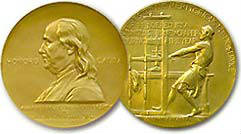Pulitzer Prize Winning Books by Black Writers (includes Finalists)
← Back to Main Awards Page
Since 1917 the Pulitzer Prize has honored excellence in journalism and the arts. The first award was presented in 1918. The Prize recognizes American authors in six “Letters and Drama” categories; Biography/Autobiography, Fiction, General Non-Fiction, History, Poetry, and Drama (technically not a book award, but plays are all available as books and have been included here).
The first African-American writer to win a Pulitzer Prize in any of the above categories was Gwendolyn Brooks who received the award for poetry for her collection Annie Allen in 1950.
2 Books were Finalists or Winners of Pulitzer Prizes in 2025
James: A Novel
20-time BLK Bestseller, Adult Fiction (Hardcover)
- A 2024 National Bestselling Book – Adult Fiction (Hardcover)
- Best Audiobook 2025: Best Literary Fiction & Classics
- 3 Time AALBC.com Bestselling Book!
- Selected for 2 Book Club Reading Lists
- Kirkus Prize Finalist/Winner 2024
- 2025 BCALA Literary Award
- National Book Award Honor 2024
- Pulitzer Prize Finalist/Winner 2025
- Hurston/Wright Legacy Award Honored Book 2025
- American Book Award Winner 2025
A brilliant, action-packed reimagining of The Adventures of Huckleberry Finn, both harrowing and ferociously funny, told from the enslaved Jim s point of view. - From the "cult literary icon" (Oprah Daily), Pulitzer Prize Finalist, and one of the most decorated writers of our lifetime
When the enslaved Jim overhears that he is about to be sold to a man in New Orleans, separated from his wife and daughter forever, he decides to hide on nearby Jackson Island until he can formulate a plan. Meanwhile, Huck Finn has faked his own death to escape his violent father, recently returned to town. As all readers of American literature know, thus begins the dangerous and transcendent journey by raft down the Mississippi River toward the elusive and too-often-unreliable promise of the Free States and beyond.
While many narrative set pieces of The Adventures of Huckleberry Finn remain in place (floods and storms, stumbling across both unexpected death and unexpected treasure in the myriad stopping points along the river s banks, encountering the scam artists posing as the Duke and Dauphin ), Jim s agency, intelligence and compassion are shown in a radically new light.
Brimming with the electrifying humor and lacerating observations that have made Everett a "cult literary icon" (Oprah Daily), and one of the most decorated writers of our lifetime, James is destined to be a major publishing event and a cornerstone of twenty-first century American literature.
Combee: Harriet Tubman, the Combahee River Raid, and Black Freedom During the Civil War
1-time BLK Bestseller, Adult Nonfiction (Hardcover)
- 3 Time AALBC.com Bestselling Book!
- Selected for 2 Book Club Reading Lists
- Kirkus Prize Finalist/Winner 2024
- 2025 BCALA Literary Award
- National Book Award Honor 2024
- Pulitzer Prize Finalist/Winner 2025
- Hurston/Wright Legacy Award Honored Book 2025
- American Book Award Winner 2025
Booklist Top Ten History Books of 2024
Most Americans know of Harriet Tubman s legendary life: escaping enslavement in 1849, she led more than 60 others out of bondage via the Underground Railroad, gave instructions on getting to freedom to scores more, and went on to live a lifetime fighting for change. Yet the many biographies, children s books, and films about Tubman omit a crucial chapter: during the Civil War, hired by the Union Army, she ventured into the heart of slave territory Beaufort, South Carolina to live, work, and gather intelligence for a daring raid up the Combahee River to attack the major plantations of Rice Country, the breadbasket of the Confederacy.
Edda L. Fields-Black herself a descendent of one of the participants in the raid shows how Tubman commanded a ring of spies, scouts, and pilots and participated in military expeditions behind Confederate lines. On June 2, 1863, Tubman and her crew piloted two regiments of Black US Army soldiers, the Second South Carolina Volunteers, and their white commanders up coastal South Carolina s Combahee River in three gunboats. In a matter of hours, they torched eight rice plantations and liberated 730 people, people whose Lowcountry Creole language and culture Tubman could not even understand. Black men who had liberated themselves from bondage on South Carolina s Sea Island cotton plantations after the Battle of Port Royal in November 1861 enlisted in the Second South Carolina Volunteers and risked their lives in the effort.
Using previously unexamined documents, including Tubman s US Civil War Pension File, bills of sale, wills, marriage settlements, and estate papers from planters families, Fields-Black brings to life intergenerational, extended enslaved families, neighbors, praise-house members, and sweethearts forced to work in South Carolina s deadly tidal rice swamps, sold, and separated during the antebellum period. When Tubman and the gunboats arrived and blew their steam whistles, many of those people clambered aboard, sailed to freedom, and were eventually reunited with their families. The able-bodied Black men freed in the Combahee River Raid enlisted in the Second South Carolina Volunteers and fought behind Confederate lines for the freedom of others still enslaved not just in South Carolina but Georgia and Florida.
After the war, many returned to the same rice plantations from which they had escaped, purchased land, married, and buried each other. These formerly enslaved peoples on the Sea Island indigo and cotton plantations, together with those in the semi-urban port cities of Charleston, Beaufort, and Savannah, and on rice plantations in the coastal plains, created the distinctly American Gullah Geechee dialect, culture, and identity perhaps the most significant legacy of Harriet Tubman s Combahee River Raid.


